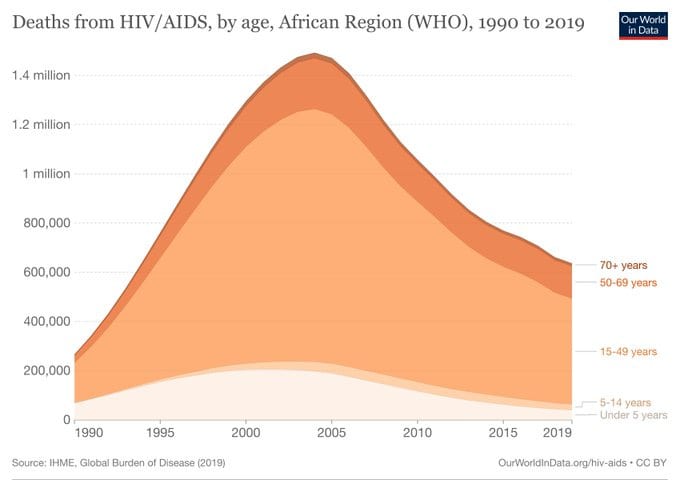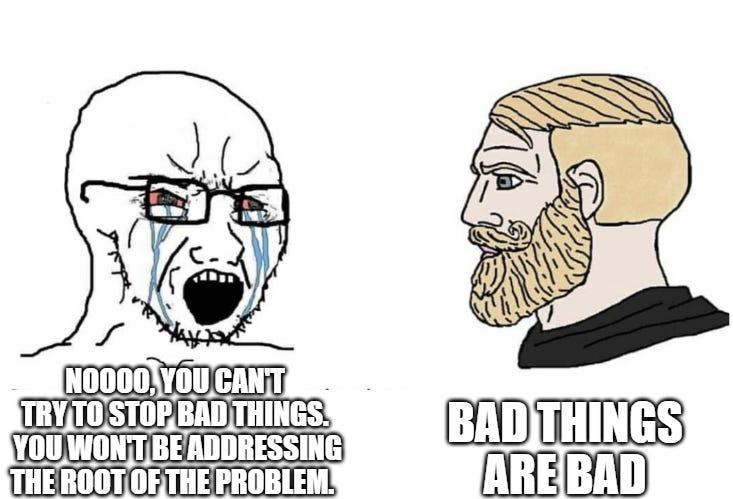Crosspost form an article on my tooooootally amaaaaaaaazing blog that you should definitely check out!
I’ve spent a few recent articles arguing that PEPFAR is really valuable and attempts to cut it would be disastrous. PEPFAR is an international program that combats HIV—it’s saved many millions of lives. Probably the most common response has been roughly the following: “sure PEPFAR saves a few kids from diseases, but it doesn’t address the root cause of the problem which is [gestures vaguely at whatever bit of one’s ideology explains why bad things happen].”
Now, when it comes to PEPFAR, this is simply factually wrong. It is addressing the root of the problem. You can see this if you look at a graph of HIV deaths over time:

People also make the same objection to effective altruism. They’ll say: “effective altruism only is a palliative solution, that doesn’t address the root of the problem which is capitalism/communism/corrupt sclerotic government/international Jewery/archons of this eon.” I think this is a very bad objection, made all the more irritating by how common it is.
Imagine you came across someone who had just been shot with a gun and was bleeding out. “Please help me,” he cries out. “Well,” you reply, “if we want to get serious about the gun violence crisis in this country, we’ll have to take on the fact that guns are very common. Thoughts, prayers, and calling ambulances are not enough. Thus, I will not help you—that would just be a partial solution that doesn’t address that root of the problem.”
This would be extremely dumb. Sure, saving the guy by calling 911 wouldn’t address the root of the problem, but it would stop a very bad thing from happening. I’m going to get in trouble for saying this, and I know it’s not politically correct, but bad things are bad and we should try to stop them! For those who get their political views by identifying which person is the chad in the wojak meme, the following example will help illustrate the principle:

Similarly, if a person gives to the against malaria foundation, they are not addressing the root cause of malaria. But so what? Jeffrey Dahmer was not the root cause of murder in the United States, but it was still bad that he went around killing and eating people. If one fewer child dies of malaria, even if you haven’t stopped all malaria in the world, you’ve done something really valuable. Will MacAskill has a good quote about this:
Sometimes we look at the size of the problems in the world and think, ‘Anything I do would be just a drop in the bucket. So why bother?’ But that reasoning doesn’t make any sense. It’s the size of the drop that matters, not the size of the bucket, and if we choose, we can create an enormous drop. That we can’t solve all the problems in the world doesn’t alter in any way the fact that, if we choose, we can transform the lives of thousands of people.”
When analyzing how good an action is, therefore, it makes sense to look at how much good one is doing not the percent of the problem that one is solving. If an action is effective and saves lots of lives, then it’s a good thing whether or not it solves the root cause of a problem.
But the slogan about addressing the root cause of problems is ill-conceived for another reason: solving a problem doesn’t require addressing the root cause of it!
What was the root cause of smallpox? Well, in a broad sense, it was evolution’s tendency to bring about horrifying viruses so long as the mechanism by which the viruses kill us allow them to survive and reproduce. The root cause of smallpox, therefore, is really something deeply woven into the evolutionary process. It’s not something we can easily get rid of.
But despite that, we got rid of smallpox. Smallpox killed hundreds of millions of people, and we simply got rid of it. It took a coordinated effort from the global health community, but it did not require addressing the root cause of smallpox. Bad things are effects; to address an effect, one doesn’t need necessarily to address its root cause. Or, once again for those who get their position by deciding who is the gigachad in the meme:

The root cause of starvation is the evolutionary competition for resources. But we didn’t have to solve that to end most starvation. All we had to do was build robust institutions to grow more food!
PEPFAR has been hugely successful in reducing the number of people killed by HIV. Antimalarial bednets have likewise been hugely successful in reducing malaria rates. Do they address the root cause of the problem? It depends on exactly what you define as the root cause. But eradicating a major problem doesn’t require addressing its root cause.
I don’t know the root cause of cannibalism, but arresting Jeffrey Dahmer did a lot to reduce cannibalism. For it to do that, it didn’t need to address whatever the ultimate cause of cannibalism was. And it would still have been good to arrest him even if there had been a bunch of other roaming cannibals, so that arresting Dahmer only stopped a small portion of global cannibalism.
Talk about addressing root causes is generally a fig-leaf for inaction. The root causes of most of the world’s ills are quite broad structural features of the world. They’re generally not the sorts of things that are easily solved. If you never plan to address concrete evils until you take on whatever highly general feature of the world explains why they exist, then you’re never going to take on evils. Talk about root causes often serves as an excuse to do nothing and be smug about it.
This is certainly how it’s treated among left-wing academics. Such people tend to criticize effective altruism on the grounds that it doesn’t address the capitalist system that causes all the bad things in the world; we know that capitalism causes all the world’s ills because it’s asserted by pompous, economically illiterate English professors at second-rate institutions whose primary research focus is the ecopolitics of queer sexuality in the writings of Derrida and Foucault, and who have been a visiting lecturer at clown college for three years. But even if you hold the stupendously false view that capitalism is responsible for all the bad things in the world, you shouldn’t do nothing as kids die because capitalism is the root cause of the kids dying. At the very least, you shouldn’t smugly condemn those who endorse doing something about those kids dying!
I do not know what the root cause of people thinking that it’s only worth addressing root causes is. Probably it’s some more general human irrationality. But hopefully this article has successfully dealt with this tendency, even without addressing its root cause!

Thank you for writing this, it is useful to see how some EA-ers might view me! I don't go around criticising EA for not addressing root causes, but I feel it is important we address them and I have queried the apparent lack recognition of them in EA. Alongside that I’d don’t deny the need for immediate interventions right now. It's not either/or.
I feel like the framing of an either/or choice in the post is reductive. The EA movement should be broad enough to have a more nuanced approach to look at root causes - it is possible these could have huge ripple effects - while acknowledging the need for continued direct interventions. We can, to continue your narrative, help the person who has been shot while also working on policy reform around gun control. Noting, you can follow a chain of root causes all the way to arguing the root cause is violent behaviour in a society which accepts such casual violence. Surely the key to doing the most good is finding the sweet spot of a tractable root cause?
If we ignore root causes and only focus on the immediate inventions there are a number of risks:
1. The underlying issues worsen and expand faster that we can address their symptoms. For example, if we only provide malaria nets without addressing climate change, rising temperatures and shifting rainfall patterns could expand malaria zones into new regions, overwhelming our capacity to help.
2. We might exhaust limited resources treating symptoms while the source of the problem continues to generate new case. Like trying to bail out a boat without fixing the leak – you’ll eventually get tired.
3. We miss a chance to prevent suffering entirely. Rather than treating waterborne illnesses let’s invest in the sanitation infrastructure to ensure no one becomes ill to start with!
4. Root causes interact and amplify each other, making problems more difficult to solve without addressing the underlying systems. For example, factory farming relies on antibiotics to keep animals healthy in crowded situations. The drive to maximise output and profits has led to concentrated animal feeding operations (CAFOs). Overuse of antibiotics (enabled by poor regulation of antibiotics) leads to drug-resistant bacteria which spread to humans through food, water and the environment. As antibiotic resistance grows treating infections becomes harder, threatening public health and increasing health care costs. Simply reducing antibiotic use without changing factory farm conditions would still leave animals vulnerable to disease, for example
This doesn’t mean EA should stop direct interventions – help is required now. But we need a balanced approach that includes immediate interventions and long-term systemic change.
I was gonna write something similar, but I think this comment nailed it (kudos KarenS). So I'll highlight two key arguments I endorse:
- Framing mitigating the worst immediate effects and addressing upstream drivers as mutually exclusive is unhelpfully reductionist and, as other have pointed out, distracts from good arguments to invest in reacting to immediate effects over root causes.
- Addressing upstream causes/systems change can have higher ROI than just addressing immediate effects in the long term and especially with issues that continue on in perpetuity w
... (read more)